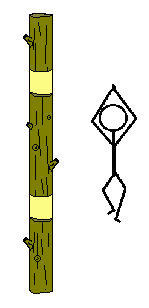
 Cortright
Homepage
Cortright
Homepage
 |
Simon of Cyrene and the Cross |
Mark 15:20-21
And when they had mocked him,
they took off the purple from him, and put his own clothes on him, and
led [dragged or carried] him
out to crucify him.
And they compel one Simon a Cyrenian,
who passed by, coming out of the country, the
father of Alexander and Rufus, to bear [airo,
to raise, to carry] his cross.
Luke 23:26
And as they led [dragged
or carried] him away, they laid hold upon
one Simon, a Cyrenian, coming out of the country, and on him they laid
the cross, that he might bear [Greek: phero,
sustain, support] it after [behind]
Jesus.
There is no indication that Jesus touched the cross during any of this. He certainly was in no physical condition to carry a cross; he had so suffered that he could not even carry his own body's weight. The soldiers had to support Jesus under the arms and drag him to Calvary.
Simon was a Judean from the city of Cyrene in Libya. He had come to Jerusalem to celebrate the Passover and the Feast of Unleavened Bread as required by the law for all Judean males. He certainly had no desire to carry the cross of a criminal. In so doing he would have been ceremonially unclean and therefore unable to eat the passover meal. Although an extreme indignity and humiliation, in the end this unexpected event may have turned out to mean salvation for him and his family. The mention of his sons, Alexander and Rufus, indicates that they were known to Mark the writer of that Gospel. Believers from Cyrene are noted in the epistles as is a believer named Rufus.
The common misconception that Jesus, rather than Simon, carried his own cross comes from a misunderstanding of the scripture recorded in the Gospel of John:
John 19:16-17
Then delivered he [Pilate]
him [Jesus] therefore
unto them [the soldiers]
to be crucified. And they took Jesus, and led [dragged
or carried] him away.
And he [Jesus]
bearing [Greek: bastazo]
his cross went forth into a place called the place of a skull, which
is called in the Hebrew Golgotha.
While the Greek word bastazo means "to lift or carry", it is used throughout the New Testament in a figure of speech referring to bearing a spiritual burden. The "cross" is also used in this figurative way. Jesus Christ bore our sins, infirmities, and sicknesses. The "cross" Jesus bore was a spiritual one.
Matthew 8:17
That it might be fulfilled which
was spoken by Esaias the prophet, saying, Himself took our infirmities,
and bare [bastazo] our
sicknesses.
Colossians 2:14
Blotting out the handwriting
of ordinances that was against us, which was contrary to us, and took it
out of the way, nailing it to his cross.
Luke 14:27
And whosoever doth not bear [bastazo]
his cross, and come after me, cannot be my disciple.
Galatians 6:14
But God forbid that I should
glory, save in the cross of our Lord Jesus Christ, by whom the world is
crucified unto me, and I unto the world.
I Corinthians 1:17-18
For Christ sent me [Paul]
not to baptize, but to preach the gospel: not with wisdom of words, lest
the cross of Christ should be made of none effect.
For the preaching of the cross
is to them that perish foolishness; but unto us which are saved it is the
power of God.
The word "cross" refers to the death of Jesus Christ on the cross and the accomplishments of that death. A wooden cross could never give us anything but death. The accomplishments of Christ on the cross bring us freedom from sin, sickness, legalism, and mental anguish. By way of his sacrifice we have received holy spirit - his cross is indeed for us the power of God!
Simon of Cyrene bore the wooden
cross; Jesus Christ obeyed God and bore all our reproach, our judgment,
our sin, our guilt, and our sickness. He bore this spiritual cross
for us by the freedom of his will. What a wonderful savior!
 Cortright
Fellowship
Cortright
Fellowship
URL http://www.cortright.org/simonc.htm
© Copyright March 1999 Michael Cortright